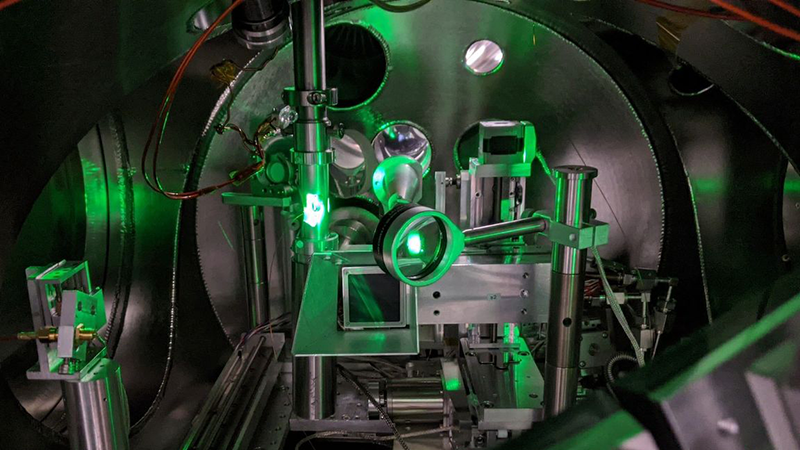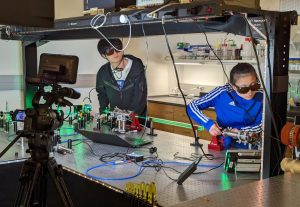UCLA Launches New Quantum Innovation Hub to Advance Quantum Science and Engineering
Effort is part of the new UCLA Research Park housed in the former L.A. Westside Pavilion

Sergio Carbajo/UCLA Samueli
Sophisticated machines like this one used by the UCLA Samueli School of Engineering allow scientists to record electrons, atoms and molecules in motion to better understand how quantum systems function and evolve.
UCLA’s new quantum innovation hub will occupy space at the UCLA Research Park on the site of the former Westside Pavilion shopping mall with an eye toward producing major advances in computing, communications, sensing and other areas, and training a new workforce for the burgeoning field.
Directed by UCLA’s Center for Quantum Science and Engineering, which is operated jointly by the UCLA College’s Division of Physical Sciences and the UCLA Samueli School of Engineering, the new enterprise will bring together faculty members and researchers from UCLA and other institutions, government and industry partners, leading startups, and students in a collective, multidisciplinary effort to advance the state of the science.
What is quantum science?
Quantum science seeks to better understand and harness the unique behavior of particles at the subatomic level to deepen our knowledge of the universe and to greatly increase the power and scope of our technologies.
With quantum computing, for example, researchers hope to capitalize on the fact that tiny particles can exist simultaneously in multiple states at once and can be strongly “entangled,” unlike traditional binary computer bits, which can exist in only one of two states and are independent of each other. The objective is to create machines based on quantum bits, or qubits, that are many orders of magnitude more powerful than today’s computers.
And understanding the ways in which quantum systems operate in the natural world — for instance, how quantum physics determine how birds and other animals navigate — could help scientists develop new sensors with unprecedented levels of sensitivity.
Potential applications of quantum systems range from health and medicine to communications, aerospace, encryption, national security and more.
The center’s leaders
The Center for Quantum Science and Engineering is headed by:
► Mark Gyure, executive director and adjunct professor of electrical and computer engineering at UCLA Samueli
► Kang Wang, director and distinguished professor of electrical and computer engineering and of materials science and engineering at UCLA Samueli
► Eric Hudson, co-director and professor of physics in the UCLA College
► Richard Ross, education director and director of the quantum science and technology master’s degree program in the UCLA Department of Physics and Astronomy

UCLA: At the vanguard of quantum technology
In recent years, UCLA has emerged as a leader in quantum information science and technology, and government and industry funding has grown significantly. Among that support: The National Science Foundation awarded $25 million to UCLA and several other universities in 2020 to create the NSF Quantum Leap Challenge Institute for Present and Future Quantum Computation, which will be housed at the new research park. In 2021, the campus received a $3 million grant from the agency for fellowships to train doctoral students in quantum science and engineering, and UCLA has launched a first-of-its-kind master’s degree program designed to prepare students for careers in quantum technologies.
In 2022, the NSF funded UCLA’s new Center for Advanced Molecular Architectures for Quantum Information Science, which is working to develop scalable building blocks of quantum computers. Also in 2022, aerospace company Boeing pledged $5 million to support the work of faculty at the Center for Quantum Science and Engineering. And in 2023, UCLA received NSF funding for research on distributed quantum entanglement aimed at developing sensing technologies that can measure atmospheric and aerosol chemicals at previously impossible levels.
Mark Gyure, executive director of the Center for Quantum Science and Engineering, said the investments and the center’s relationships with Boeing and other industry partners would help establish UCLA, Los Angeles and the Southern California region as a major nexus for quantum science and technology.
With strong collaborations between faculty and quantum companies such HRL Laboratories already in place, the expansion to the new UCLA Research Park will only aid in the fulfillment of that promise.
